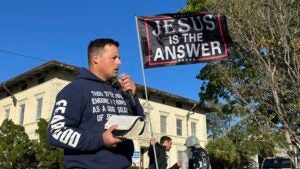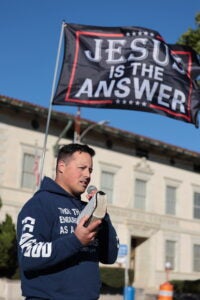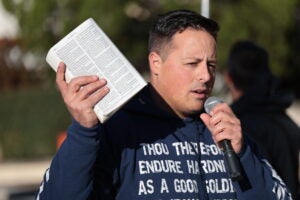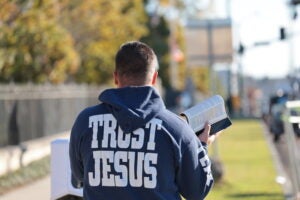Supreme Court Media Kit |
The Silenced Evangelist
Gabriel Olivier is a Christian who feels a duty to share his beliefs with those he meets. Standing outside of well-attended events, Olivier conveys the gospel of Jesus Christ, hoping to have peaceful conversations and reach as many people as possible.
Unfortunately, Olivier’s evangelism was silenced when the City of Brandon, Mississippi, issued an unconstitutional ordinance that prohibited him from communicating his religious beliefs to others in a city park. The City prohibits Olivier by law from engaging in religious speech – whether through oral dialogue, signs, literature, expressive clothing, or one-on-one conversations, it makes no difference – on city-owned sidewalks and grassy areas in the park. Instead, he is forced to go and evangelize in a remote “protest” area where his message can be neither be heard nor seen. Dissatisfied with the “protest” area, Olivier tried to speak in the park where he could reach people. Soon after, City police arrested him for violating the ordinance. He paid the fine and was released.
Challenge Dismissed
But wanting to go back and share his message, Olivier subsequently brought a challenge to the law in federal court. The district court dismissed his constitutional claim, without even considering the merits of it, relying on Fifth Circuit precedent and a Supreme Court case, Heck v. Humphrey, that held a prisoner could not bring a constitutional claim challenging sentencing and must instead rely on habeas corpus, a recourse only available for prisoners.
The application of the Heck doctrine to Olivier is misplaced. He was never a prisoner so he never had the ability to pursue habeas corpus. The court has effectively denied Olivier of his day in court. As a result, First Liberty and the law firm Gibson Dunn have filed a petition to the Supreme Court of the United States, asking the Justices to grant Olivier his right to challenge this unconstitutional ordinance.
Onto the Supreme Court
The Supreme Court heard oral argument in the case on December 3, 2025.
Kelly Shackelford, President, CEO, and Chief Counsel to First Liberty Institute said, “It is completely unacceptable that Gabe had his religious liberty rights extinguished by a city ordinance, but it is unconscionable that he was prevented from even having his day in court by a misapplied precedent. Court decisions that prevent Americans from bringing lawsuits against laws that violate their rights endanger all of our civil rights.”
Gabe Olivier said, “I am grateful to have had my case heard by the U.S. Supreme Court—an opportunity few others in my situation have ever had. I pray this case results in a decision that allows others to be able to fight for their First Amendment rights in court.”
Allyson Ho of Gibson Dunn & Crutcher, who presented argument to the Justices on behalf of Olivier stated, “We’re grateful the Court heard argument today in Mr. Olivier’s case. His courage in standing up for the free speech rights of all Americans is an inspiration.”
Nate Kellum, Senior Counsel at First Liberty said, “Gabe’s last shot at justice lies with the Justices, who can right this wrong and resolve an issue that has sharply divided circuit courts: can a person previously convicted under an unconstitutional law challenge that law in court. All Americans deserve their day in court, particularly, when constitutional rights are at stake.”
We now await a ruling from the Supreme Court.
Press Statement
For Immediate Release: 12.3.25
Contact: John Manning, media@firstliberty.org
Direct: 972-941-4453
Statements from Olivier Attorneys on Today’s U.S. Supreme Court Oral Argument in Olivier v. City of Brandon
Washington, D.C.—The Supreme Court of the United States today heard oral argument in Olivier v. City of Brandon. Olivier is represented by First Liberty Institute and the law firm Gibson Dunn & Crutcher LLP.
Kelly Shackelford, President, CEO, and Chief Counsel to First Liberty Institute:
It is completely unacceptable that Gabe had his religious liberty rights extinguished by a city ordinance, but it is unconscionable that he was prevented from even having his day in court by a misapplied precedent. Court decisions that prevent Americans from bringing lawsuits against laws that violate their rights endanger all of our civil rights.
Gabe Olivier:
I am grateful to have had my case heard by the U.S. Supreme Court—an opportunity few others in my situation have ever had. I pray this case results in a decision that allows others to be able to fight for their First Amendment rights in court.
Allyson Ho of Gibson Dunn & Crutcher, who presented argument to the Justices on behalf of Olivier:
We’re grateful the Court heard argument today in Mr. Olivier’s case. His courage in standing up for the free speech rights of all Americans is an inspiration.
Nate Kellum, Senior Counsel at First Liberty:
Gabe’s last shot at justice lies with the Justices, who can right this wrong and resolve an issue that has sharply divided circuit courts: can a person previously convicted under an unconstitutional law challenge that law in court. All Americans deserve their day in court, particularly, when constitutional rights are at stake.
# # #
About First Liberty Institute
First Liberty Institute is the largest legal organization in the nation dedicated exclusively to defending religious freedom for all Americans.
To arrange an interview, contact John Manning at media@firstliberty.org or by calling 972-941-4453.
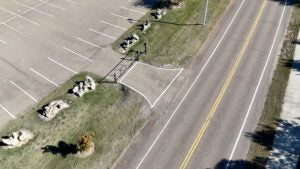
Free Speech Zone

Free Speech Zone
